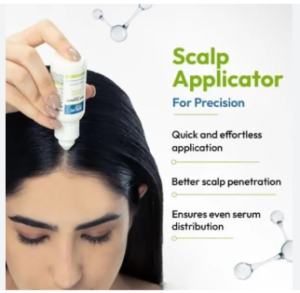What is Hair Serum?
Before diving into its pros and cons, it’s helpful to know what are the Advantages and Disadvantages of Hair serum and what it does. Hair serum is a leave-in treatment typically used after washing and conditioning hair. It is formulated with active ingredients such as oils, silicones, and proteins that help address a variety of hair issues, from frizz and dryness to lack of shine and heat protection. Unlike traditional hair oils, hair serums are generally lighter, providing a more controlled application and giving you a more polished finish without the greasy feeling that sometimes comes with oils.
Advantages of Using Hair Serum
- Frizz Control
One of the most significant benefits of using a hair serum is its ability to control frizz. Hair serums work by smoothing the cuticle (the outer layer of each hair strand), helping to lock moisture in and prevent humidity from causing hair to swell and frizz. This is particularly beneficial for people with curly, coarse, or wavy hair, which tends to frizz up more easily. - Enhanced Shine
Hair serums can instantly add shine to your hair, making it look healthier and more vibrant. This is due to the silicone or oil content in many serums, which helps reflect light and give hair a glossy, polished appearance. For individuals with dull or lifeless hair, a serum can be a quick fix to make your hair look shinier and more radiant. - Heat Protection
Many hair serums are formulated with ingredients that provide a barrier between your hair and heat styling tools such as straighteners, curling irons, and blow dryers. This helps protect your hair from the damaging effects of high heat, which can cause dryness, split ends, and breakage. By applying serum before styling, you can shield your strands and preserve their health in the long run. - Smoothness and Softness
One of the key benefits of using a serum is how it makes the hair feel. It can make hair feel incredibly smooth, soft, and silky to the touch, which is especially helpful for people with dry or rough-textured hair. Serums often contain ingredients like silicones, which form a smooth coating around each hair strand, resulting in a glossy, velvety texture. - Detangling
Hair serums can help detangle hair by providing slip, which reduces friction between hair strands. This makes combing or brushing through wet or dry hair easier and less damaging, helping to reduce breakage. This is especially helpful for individuals with long or thick hair that tangles easily. - Protection from Environmental Damage
Some hair serums contain antioxidants and UV filters that protect hair from environmental damage. These ingredients help shield your hair from sun exposure, pollution, and other environmental factors that can contribute to dryness, fading, and damage over time. - Split-End Prevention
Regular use of a hair serum can help prevent split ends by adding moisture and improving hair’s elasticity. When your hair is hydrated and nourished, it’s less likely to break, which ultimately helps to minimize the occurrence of split ends. - Quick and Convenient
Using a hair serum is quick and easy. Most serums require only a small amount applied to damp or dry hair. Unlike traditional treatments like deep conditioning masks, which require longer application times and rinsing, serums are designed for quick absorption and don’t need to be washed out. This makes them ideal for busy mornings or for individuals who want a low-maintenance product.
Disadvantages of Using Hair Serum
- Build-Up and Weighing Down
One potential downside of using hair serum is that it can cause build-up on your hair over time, especially if used excessively. If you apply too much serum or fail to properly cleanse your hair regularly, the product can accumulate and make your hair feel heavy, greasy, or weighed down. This is more common with serums containing oils or silicones, which can be difficult to wash out completely. - Not Suitable for All Hair Types
While hair serums work wonders for many hair types, they may not be suitable for everyone. People with fine or thin hair may find that certain serums, particularly those with heavier oils or silicones, can make their hair appear limp or greasy. For those with fine hair, it’s important to choose a lightweight serum to avoid this problem. - Temporary Solution
Hair serums are effective for providing immediate results, but they don’t necessarily address the underlying causes of hair issues such as damage, split ends, or dryness. While serums can temporarily improve the texture and appearance of your hair, they don’t provide a permanent solution to hair health. Long-term hair care solutions, such as deep conditioning treatments or lifestyle changes, may be necessary for lasting results. - Potential for Overuse
With hair serums, it’s easy to fall into the trap of over-application. Because serums are often designed to be lightweight and fast-absorbing, you might be tempted to apply more than necessary, thinking that more will yield better results. However, using too much can cause your hair to look greasy and weighed down. It’s important to find the right amount for your hair type and needs, and apply sparingly. - Not Always Free from Chemicals
Some hair serums contain silicones, parabens, and other synthetic chemicals that may not be suitable for individuals looking for all-natural or organic hair care products. While these ingredients can offer smoothing and detangling benefits, they may also contribute to product build-up over time. If you prefer natural products or have sensitive skin, it’s essential to check the ingredients list carefully. - Cost
High-quality hair serums, particularly those with nourishing ingredients like argan oil, keratin, or other premium oils, can be expensive. If you’re on a budget, finding a good serum that fits within your price range might be a challenge. In addition, because hair serums are often concentrated, you’ll need to buy them more frequently, which can add to the cost in the long run. - Not Effective on Extremely Damaged Hair
If your hair is extremely damaged, over-processed, or chemically treated, a serum may not be enough to restore its health. While serums can help improve the appearance of hair temporarily, they cannot fully repair severely damaged strands. In such cases, you may need to incorporate additional treatments, such as protein-based masks or regular salon visits, to address the damage.
Hair serums can be a game-changer for many individuals, providing a wide range of benefits such as frizz control, enhanced shine, heat protection, and smoother, more manageable hair. However, like any beauty product, they also have their drawbacks, including the potential for build-up, overuse, and suitability issues for certain hair types.
Before incorporating a serum into your hair care routine, it’s important to consider your hair type, needs, and preferences. For some, a serum might be the perfect solution for frizzy or dry hair, while others may need to opt for a more specialized treatment depending on the health of their strands.
Ultimately, when used correctly and in moderation, hair serum can provide significant improvements in the texture, appearance, and manageability of your hair, leaving you with smooth, shiny, and protected locks.




